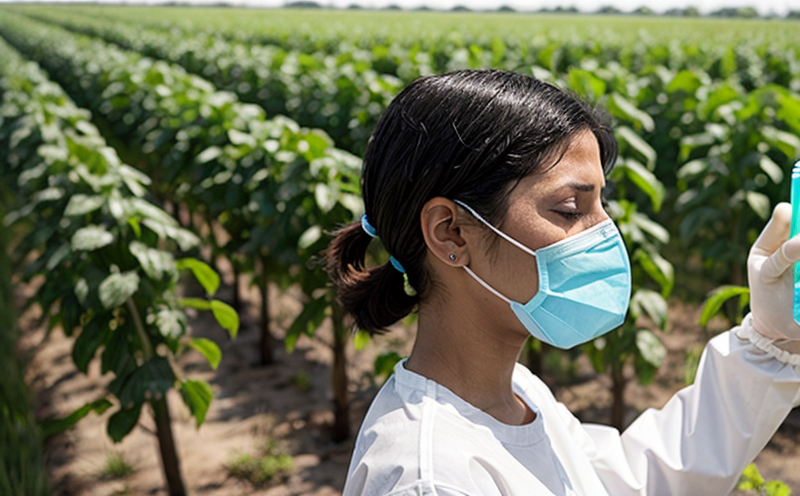EN 16619 Pesticides in Surface Water Test
The EN 16619 standard is a crucial tool for ensuring that surface water bodies are not contaminated by pesticides, which can pose significant risks to aquatic ecosystems and human health. This test measures the presence of specific pesticides within the water, providing critical data for environmental protection and compliance with international standards.
Water quality testing in this context is vital because pesticides, when washed into surface waters through rain or irrigation runoff, can accumulate and have long-lasting effects on the environment. Pesticides such as organophosphates, pyrethroids, and carbamates are widely used in agriculture but can be harmful to aquatic life if present in concentrations above safe thresholds.
The EN 16619 standard specifies a comprehensive approach for detecting pesticides in surface water using liquid chromatography with tandem mass spectrometry (LC-MS/MS). This method is highly sensitive and allows for the identification of trace amounts of pesticides, making it ideal for monitoring compliance with environmental regulations.
The testing process begins with the collection of water samples from designated sites. These samples are then prepared using filtration methods to remove particulate matter and other contaminants that could interfere with the analysis. The filtered samples undergo rigorous extraction procedures followed by injection into a high-performance liquid chromatograph equipped with an MS/MS detector.
The analytical results are compared against established reference values provided in EN 16619, which outline the permissible levels of pesticides allowed in surface water for human and environmental safety. Compliance with these limits is essential to prevent contamination and ensure that aquatic ecosystems remain healthy.
Our laboratory utilizes state-of-the-art LC-MS/MS instrumentation to provide accurate and reliable test results. This ensures that clients receive precise data on pesticide concentrations, enabling them to make informed decisions regarding their agricultural practices or industrial processes.
The importance of this service cannot be overstated, especially in regions where agriculture is a major industry. By adhering to EN 16619 guidelines, businesses and organizations can minimize their environmental impact while maintaining compliance with regulatory requirements.
Our team of experienced scientists and technicians provides expert guidance throughout the entire testing process, from sample collection to final report generation. We offer tailored solutions based on client needs, ensuring that our services meet the highest quality standards.
| Key Parameters | Description |
|---|---|
| Pesticide Identification | Determination of specific pesticides present in surface water samples using LC-MS/MS. |
| Sensitivity Limits | Absence of false positives and accurate quantification at trace levels. |
| Sample Preparation | Filtration, extraction, and injection into the chromatograph for analysis. |
| Data Analysis | Comparison against reference values provided in EN 16619. |
The robustness of this testing method ensures that even minute traces of pesticides can be detected, thus helping to protect our invaluable water resources. By offering accurate and reliable results through the EN 16619 standard, we contribute significantly to environmental preservation efforts globally.
Scope and Methodology
- Pesticide Identification: Using LC-MS/MS technology, our laboratory identifies various types of pesticides present in surface water samples.
- Sensitivity Limits: Our methods ensure accurate quantification at trace levels without false positives.
- Sample Preparation: Samples undergo filtration and extraction processes before being analyzed by the chromatograph.
- Data Analysis: Results are compared against reference values outlined in EN 16619 to determine compliance with safety standards.
The detailed methodology employed ensures that our clients receive precise and reliable test results, which are essential for making informed decisions about their operations. Compliance with these stringent testing protocols demonstrates a commitment to environmental responsibility and regulatory adherence.
International Acceptance and Recognition
The EN 16619 standard has gained widespread acceptance across Europe and internationally, being recognized by numerous countries as a benchmark for ensuring the safety of surface waters from pesticide contamination. This standard is particularly important in regions where agriculture plays a significant role, such as Western Europe, North America, and parts of Asia.
Organizations like the European Commission, national environmental agencies, and various industry associations have adopted EN 16619 to enhance their monitoring capabilities regarding surface water quality. By aligning with this standard, businesses can ensure they are meeting regulatory requirements while contributing positively to environmental conservation efforts.
The use of this standard reflects a global consensus on the importance of protecting natural resources from harmful contaminants like pesticides. It also highlights the commitment of various stakeholders towards sustainable practices that support both economic growth and ecological preservation.
Our laboratory’s adherence to EN 16619 not only ensures compliance with international standards but also helps maintain trust among clients who rely on accurate test results for strategic decision-making purposes. By staying at the forefront of this technology, we continue to provide reliable services that contribute significantly towards safeguarding our planet's precious water resources.
Environmental and Sustainability Contributions
- Reduction in Pesticide Pollution: Accurate identification and quantification of pesticides help minimize their release into surface waters, thereby reducing pollution levels.
- Aquatic Ecosystem Protection: By ensuring that pesticide concentrations remain within safe limits, we contribute to preserving aquatic ecosystems' health and biodiversity.
- Sustainable Agricultural Practices: Clients can use our test results to implement more sustainable agricultural practices, leading to reduced environmental footprints.
- Regulatory Compliance: Adherence to EN 16619 ensures that clients comply with international regulations, avoiding potential fines or legal issues.
The implementation of this service supports broader goals related to sustainability and responsible resource management. Through our commitment to providing accurate and reliable testing services based on the EN 16619 standard, we aim to promote a healthier environment for future generations.





